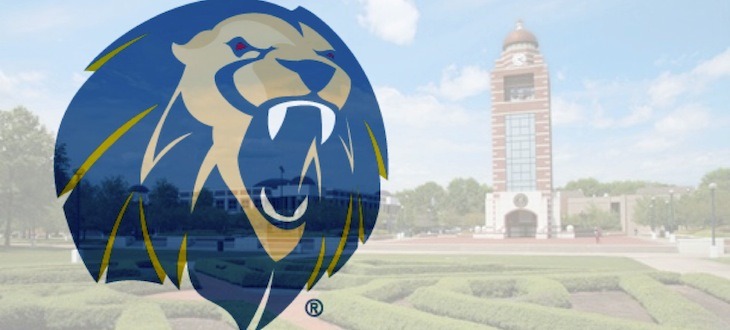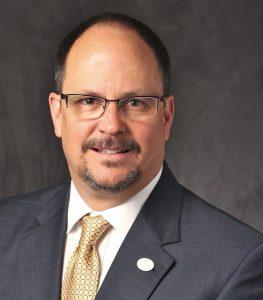UAFS chancellor candidate praises ‘remarkable’ growth of the institution
by March 28, 2019 9:38 pm 1,320 views

Robert Marley joked that he was curious as to how many people gathered Thursday (March 28) at the University of Arkansas at Fort Smith were there to see what brought a “dead reggae star” to the city.
The reference was to legendary Jamaican-born musician Bob Marley who died in 1981.
Marley, the provost and executive vice chancellor for Academic Affairs at the Missouri University of Science and Technology in Rolla, was in Fort Smith as part of the interview process for UAFS chancellor. He is one of four finalists for the job.
Marley was named as one of five candidates for chancellor at New Mexico State University in Las Cruces, N.M., in 2018. Also in 2018, he was a finalist for president at Idaho State University in Pocatello, Idaho. In 2017, he was one of four finalists for president of South Dakota School of Mines & Technology in Pierre, S.D. He was a finalist in the search for a president at Arkansas Tech University in 2015.
Dr. Marilyn Wells, provost and senior vice president for academic affairs at Minnesota State University in Mankato, Minn., visited the campus earlier in the week. The remaining two finalists will visit the campus over the next two weeks.
• Philip Way, Ph.D.: provost and vice president for Academic and Student Affairs, Slippery Rock University of Pennsylvania, April 1
• Terisa Riley, Ph.D.: senior vice president for Student Affairs and University Administration, Texas A&M University at Kingsville, April 4
All public forums will be held from 3:45 to 5 p.m. in the Reynolds Room at the Smith-Pendergraft Campus Center on the UAFS campus.

The Board of Trustees of the University of Arkansas began meeting March 26 with each of the finalists. Trustees will either meet in person during each finalist’s campus visit or via teleconference originating at the University of Arkansas System – Cammack Campus. The candidates will all be meeting from UAFS. The meetings with trustees will be held in executive session from 1:45-3 p.m. on their respective dates. Wells met March 26; Marley, March 29; Way, April 2; and Riley, April 5.
‘REMARKABLE’ GROWTH
Marley told the crowd of around 75 his strengths include interdisciplinary research, new program development and fundraising, adding he was part of raising $80 million while at Montana State University.
He also said his family is familiar with the Ozarks region of the U.S., with family in Oklahoma and Kansas.
“This is part of the country that I value very much,” Marley said.
Marley admitted he was not familiar with UAFS, but before applying for the chancellor job he studied the university and said he believes the growth of the university since becoming a four-year institution “is nothing short of remarkable.”
“The more I understood about the University of Arkansas at Fort Smith, the more I became intrigued. … But I see the need for continued momentum … as this region grows, as this community grows, this institution cannot fail in that commitment (to keep growing),” Marley said.
He said UAFS has “much more” opportunity for growth, suggesting that the institution should have a national presence a national image, adding later in his presentation that “the message needs to get out nationally, maybe internationally, what you have to offer here.”
DIVERSITY, ‘NEW AND UNIQUE’
In response to audience questions, Marley said he is not going to propose specifics that “need to be done” but wanted to talk “broad” ideas for possible improvement.
As to promoting diversity, Marley said UAFS must reflect the citizens served. He said he is “not referring to having quotas” but the necessity to be “welcoming to students from all walks of life, and are we welcoming faculty from all walks of life.”
Dr. Barry Owen; chief academic officer of the Fort Smith Public Schools, asked Marley what he would do in his first 90 days if hired as UAFS chancellor. Marley said he would conduct a listening tour to learn more about “the deeper issues” on the minds of students, faculty, staff, the business community and the public, which Marley said includes elected officials. He said what he hears would help him work within the university’s existing master plan, which he said is a workable plant.
“I can work with this one. It’s a good plan,” he said.
On a question about non-credit workforce training programs, Marley said he research indicates that UAFS “has a great legacy” of serving the region’s workforce development needs and his goal would be to build on that legacy.
“If there is no one else available, we must continue that. … it’s important to basic economic development within the community,” he said.
In an answer to a question about what he would do to keep the momentum going, Marley said one example is expanding credentialing in two- and four-year programs. He said providing that service to students would not cost a lot of money and might require only modifications of what is already in place. He also said UAFS should consider adding more advanced degree programs related to healthcare, technology, education, and “data science” which can include many forms.
“I think this institution is ripe for applying itself in new and unique ways … coming up with new and unique programs that could serve this area,” Marley said.
